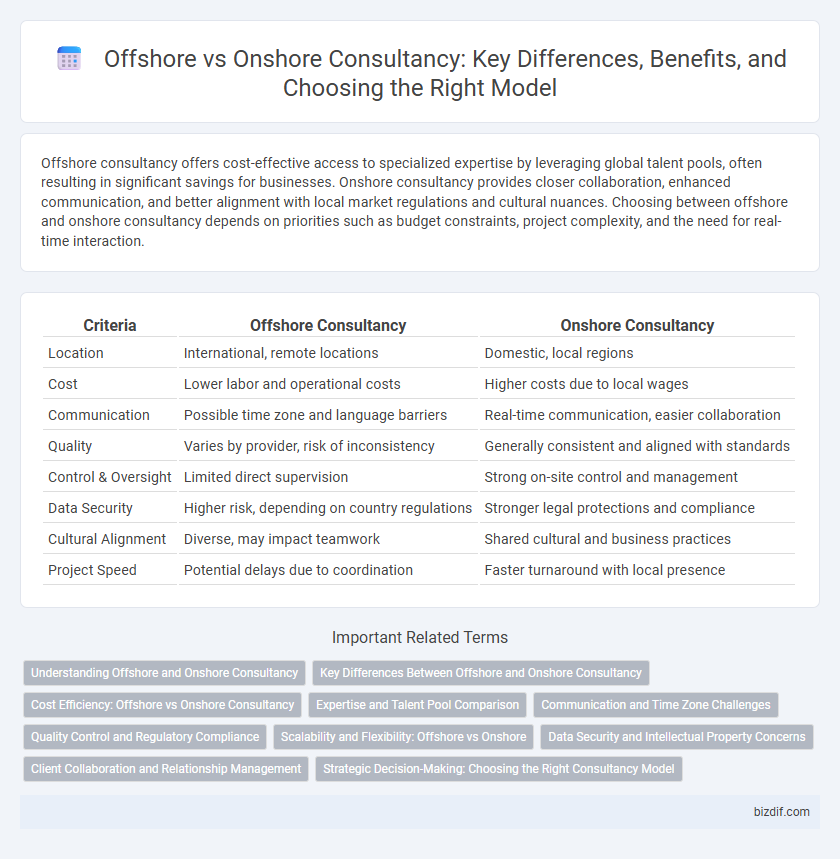Offshore consultancy offers cost-effective access to specialized expertise by leveraging global talent pools, often resulting in significant savings for businesses. Onshore consultancy provides closer collaboration, enhanced communication, and better alignment with local market regulations and cultural nuances. Choosing between offshore and onshore consultancy depends on priorities such as budget constraints, project complexity, and the need for real-time interaction.
Table of Comparison
| Criteria | Offshore Consultancy | Onshore Consultancy |
|---|---|---|
| Location | International, remote locations | Domestic, local regions |
| Cost | Lower labor and operational costs | Higher costs due to local wages |
| Communication | Possible time zone and language barriers | Real-time communication, easier collaboration |
| Quality | Varies by provider, risk of inconsistency | Generally consistent and aligned with standards |
| Control & Oversight | Limited direct supervision | Strong on-site control and management |
| Data Security | Higher risk, depending on country regulations | Stronger legal protections and compliance |
| Cultural Alignment | Diverse, may impact teamwork | Shared cultural and business practices |
| Project Speed | Potential delays due to coordination | Faster turnaround with local presence |
Understanding Offshore and Onshore Consultancy
Offshore consultancy involves delegating business advisory services to experts located in a different country, often to leverage cost advantages and specialized skills, whereas onshore consultancy utilizes local professionals within the same country to ensure better communication and cultural alignment. Key factors include time zone differences, regulatory compliance, and risk management, which deeply influence project outcomes and client satisfaction. Clients must weigh cost efficiency against ease of collaboration and market-specific expertise when deciding between offshore and onshore consultancy models.
Key Differences Between Offshore and Onshore Consultancy
Offshore consultancy offers cost-effective solutions by leveraging global talent pools, often resulting in lower operational expenses compared to onshore consultancy, which emphasizes proximity and direct client interaction for enhanced communication. Time zone differences in offshore consultancy can impact project timelines, whereas onshore consultancy typically provides faster response times due to geographic closeness. Regulatory compliance and cultural alignment are more seamlessly managed in onshore consultancy, while offshore consultancy requires careful oversight to mitigate risks associated with differing legal frameworks and business practices.
Cost Efficiency: Offshore vs Onshore Consultancy
Offshore consultancy often delivers significant cost savings due to lower labor and operational expenses in countries like India, the Philippines, and Eastern Europe. Onshore consultancy provides higher upfront costs but offers easier communication, faster turnaround, and better alignment with local regulations. Businesses must weigh the reduced hourly rates of offshore options against the potential risks of time zone differences and cultural barriers to optimize cost efficiency.
Expertise and Talent Pool Comparison
Offshore consultancy offers access to a diverse talent pool with specialized expertise in cost-effective regions, enabling businesses to leverage global skills and innovative solutions. Onshore consultancy provides consultants with deep local market knowledge and regulatory understanding, ensuring compliance and tailored strategies for regional business environments. The choice between offshore and onshore consultancy depends on balancing the need for specialized global expertise and the advantage of localized, culturally attuned talent.
Communication and Time Zone Challenges
Offshore consultancy often faces significant communication barriers due to language differences, cultural nuances, and asynchronous working hours, leading to delayed feedback and potential misunderstandings. Onshore consultancy benefits from real-time interaction and shared time zones, enabling smoother collaboration and immediate issue resolution. Effective project management tools and clearly defined communication protocols help mitigate challenges in offshore engagements but rarely match the seamless experience of onshore consultancy.
Quality Control and Regulatory Compliance
Offshore consultancy often faces challenges in quality control due to geographical distance and varying international standards, potentially impacting regulatory compliance. Onshore consultancy provides closer alignment with local regulations and easier implementation of quality control measures, ensuring higher adherence to specific legal and industry requirements. Effective collaboration and consistent auditing are critical for offshore consultants to meet the stringent regulatory frameworks comparable to onshore services.
Scalability and Flexibility: Offshore vs Onshore
Offshore consultancy offers greater scalability by enabling access to a larger talent pool and cost-effective resources, facilitating rapid project expansion without significant overhead. Onshore consultancy provides enhanced flexibility through closer geographical proximity, enabling real-time collaboration and quicker adaptation to local regulatory changes. Balancing scalability with flexibility depends on project complexity, budget constraints, and the need for seamless communication across time zones.
Data Security and Intellectual Property Concerns
Offshore consultancy often raises significant data security and intellectual property concerns due to differing regulatory standards and potential vulnerabilities in cross-border data transfer. Onshore consultancy provides enhanced control over sensitive information with compliance to local data protection laws, reducing the risk of intellectual property breaches. Organizations prioritizing strict data governance typically prefer onshore services to safeguard proprietary assets and maintain confidentiality.
Client Collaboration and Relationship Management
Offshore consultancy offers cost-effective solutions with access to global talent but may face challenges in real-time client collaboration due to time zone differences and cultural barriers. Onshore consultancy provides easier communication, stronger relationship building, and faster responsiveness through face-to-face interactions and aligned working hours. Effective client collaboration and relationship management in consultancy depend on balancing these factors to ensure transparency, trust, and project alignment.
Strategic Decision-Making: Choosing the Right Consultancy Model
Offshore consultancy offers cost-effective access to specialized expertise and scalable resources, ideal for businesses seeking global insights and efficiency in strategic decision-making. Onshore consultancy provides closer collaboration, cultural alignment, and immediate stakeholder engagement, enhancing nuanced understanding and tailored strategy development. Evaluating project complexity, communication needs, and budget constraints guides the selection between offshore and onshore consultancy models to optimize strategic outcomes.
Offshore consultancy vs Onshore consultancy Infographic

 bizdif.com
bizdif.com